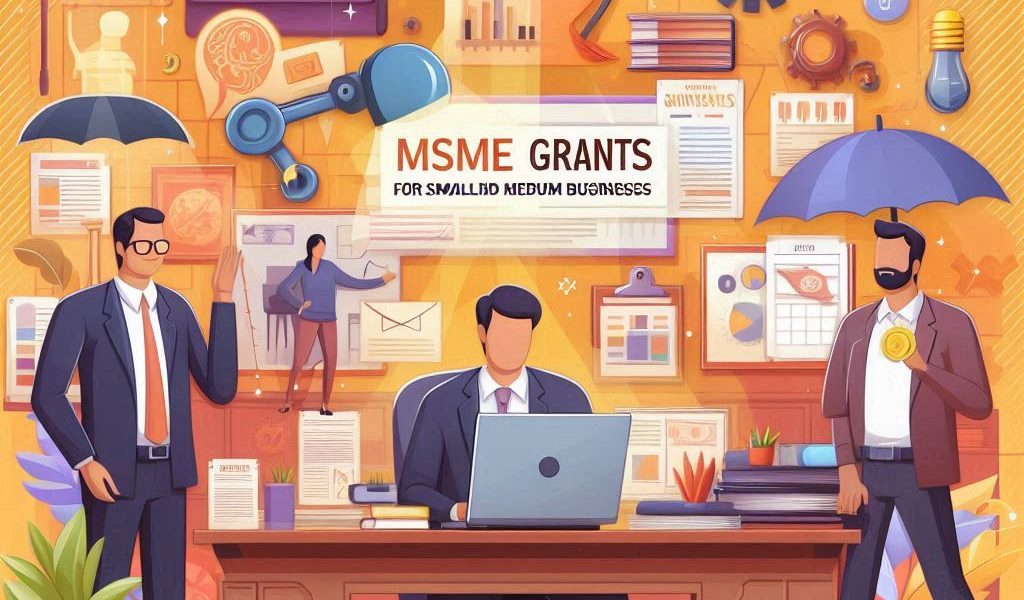Micro, Small, and Medium Enterprises (MSMEs) play a crucial role in the economic development of a country. To support their growth, governments offer various grants and subsidies that provide financial assistance, infrastructure support, and technological advancement opportunities. These grants help MSMEs expand, innovate, and compete in global markets.
In this article, we will explore the best government schemes available for small and medium businesses, their benefits, eligibility criteria, and the application process.
Understanding MSME Grants
MSME grants are financial assistance programs provided by governments to promote the growth and sustainability of small and medium enterprises. These grants aim to:
- Provide capital for business expansion
- Support innovation and technological upgrades
- Enhance export capabilities
- Encourage employment generation
- Strengthen infrastructure and skill development
Unlike loans, grants do not require repayment, making them highly beneficial for MSMEs struggling with limited financial resources.
Top Government Schemes for MSMEs
Governments worldwide offer multiple funding programs to boost MSMEs. Below are some of the best schemes available in India and other countries.
1. Prime Minister’s Employment Generation Programme (PMEGP)
Country: India
PMEGP is a flagship scheme aimed at generating employment through the establishment of MSMEs.
Key Features:
- Provides a subsidy of 15%–35% of the project cost.
- Maximum project cost: ₹25 lakh (manufacturing) and ₹10 lakh (service sector).
- Loan assistance for new entrepreneurs.
Eligibility:
- Individuals above 18 years
- MSMEs involved in manufacturing or service sectors
- No requirement of prior business experience
2. Credit Linked Capital Subsidy Scheme (CLCSS)
Country: India
CLCSS is designed to help MSMEs upgrade their technology by providing a capital subsidy.
Key Features:
- 15% capital subsidy on the purchase of plant and machinery
- Maximum subsidy: ₹15 lakh
- Applicable for specific sectors like food processing, textiles, and pharmaceuticals
Eligibility:
- MSMEs registered under the Udyam Registration
- Must adopt approved technologies
3. MUDRA Loan Scheme (Micro Units Development and Refinance Agency)
Country: India
Although technically a loan scheme, MUDRA provides financial assistance with low-interest rates and minimal collateral.
Key Features:
- Loan categories: Shishu (up to ₹50,000), Kishor (₹50,000–₹5 lakh), and Tarun (₹5 lakh–₹10 lakh)
- Supports small businesses and startups
- Loans can be used for working capital and asset purchase
Eligibility:
- Small and micro-business owners
- Startups with viable business models
4. Stand-Up India Scheme
Country: India
This scheme is focused on empowering women and entrepreneurs from Scheduled Castes (SC) and Scheduled Tribes (ST).
Key Features:
- Loan assistance between ₹10 lakh–₹1 crore
- Covers greenfield enterprises in the manufacturing, services, and trading sectors
- Encourages women-led businesses
Eligibility:
- At least 51% ownership by SC/ST or women entrepreneurs
- First-time entrepreneurs
5. Technology Upgradation Fund Scheme (TUFS)
Country: India
This scheme supports MSMEs in the textile sector by funding modernization efforts.
Key Features:
- Capital subsidy and interest reimbursement on loans
- Encourages investment in new technology
- Reduces production costs and enhances quality
Eligibility:
- MSMEs in the textile sector
- Must invest in advanced technology
6. Export Promotion Capital Goods (EPCG) Scheme
Country: India
This scheme is designed to support MSMEs that export goods by reducing customs duties on capital goods.
Key Features:
- Zero duty on import of capital goods
- Obligation to export goods worth 6 times the duty saved within 6 years
- Reduces production costs for export-driven MSMEs
Eligibility:
- Export-oriented MSMEs
- Companies with valid Importer-Exporter Code (IEC)
7. Small Business Innovation Research Program (SBIR)
Country: USA
SBIR provides research funding for MSMEs focusing on technology and innovation.
Key Features:
- Phase I: Up to $150,000 for feasibility studies
- Phase II: Up to $1 million for R&D
- Supports cutting-edge technology development
Eligibility:
- US-based small businesses
- Must have a strong R&D focus
8. SME Competitiveness Programme (COSME)
Country: European Union
COSME helps European MSMEs improve their competitiveness and access to finance.
Key Features:
- Provides financial guarantees and equity investments
- Supports international business expansion
- Encourages women entrepreneurship
Eligibility:
- MSMEs registered in the EU
- Companies with a growth-oriented business model
Benefits of MSME Grants
Government grants for MSMEs offer multiple benefits, including:
- Financial Relief: Reduces dependency on high-interest loans.
- Growth and Expansion: Helps MSMEs scale their operations.
- Technology Upgradation: Encourages businesses to adopt modern tools.
- Market Competitiveness: Enhances product quality and reduces costs.
- Employment Generation: Boosts job creation in the economy.
How to Apply for MSME Grants
Step 1: Identify Suitable Schemes
- Research government portals such as MSME Ministry websites
- Consult business advisors and financial institutions
Step 2: Check Eligibility
- Ensure your business meets the criteria for the chosen grant
- Verify sector-specific requirements
Step 3: Prepare Required Documents
- Business registration certificate (Udyam Registration)
- Financial statements and tax returns
- Project reports and funding proposals
Step 4: Submit Application
- Apply through the respective government portal
- Upload necessary documents
Step 5: Track Application Status
- Follow up with the grant authority
- Comply with verification processes
Challenges and Considerations
While government grants are beneficial, MSMEs should be aware of potential challenges:
- Lengthy approval processes may delay funding.
- Strict compliance regulations can lead to disqualification.
- Limited funding availability results in high competition.
To overcome these challenges, businesses should seek expert advice and stay updated on policy changes.
Conclusion
MSME grants provide essential financial support to small and medium businesses, enabling them to innovate, expand, and compete in global markets. By leveraging these government schemes, MSMEs can reduce costs, improve efficiency, and achieve sustainable growth.
For entrepreneurs looking to benefit from MSME grants, researching eligibility, preparing strong proposals, and applying early can enhance their chances of securing financial aid.




